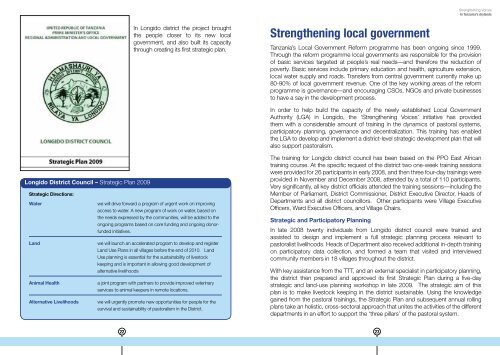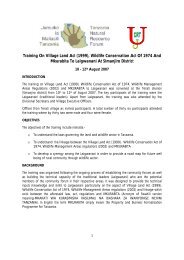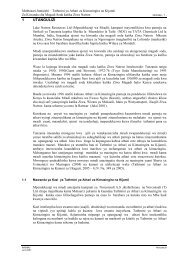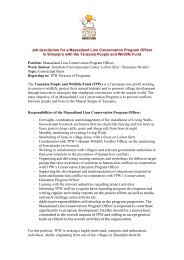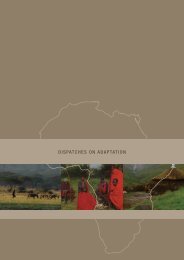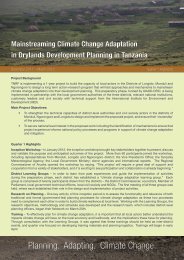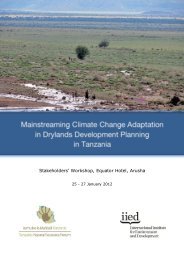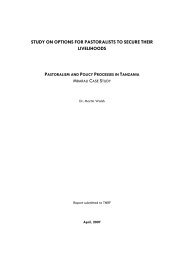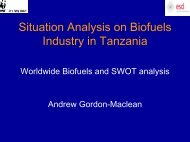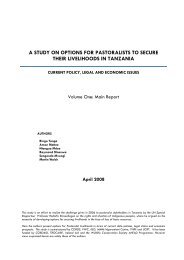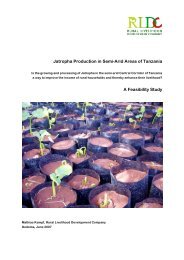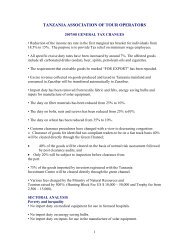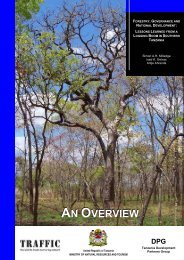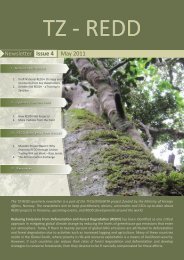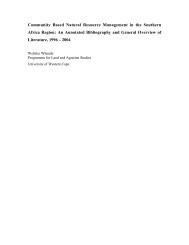Strengthening Voices
Strengthening Voices: - IIED pubs - International Institute for ...
Strengthening Voices: - IIED pubs - International Institute for ...
You also want an ePaper? Increase the reach of your titles
YUMPU automatically turns print PDFs into web optimized ePapers that Google loves.
<strong>Strengthening</strong> <strong>Voices</strong><br />
in Tanzania’s drylands<br />
In Longido district the project brought<br />
the people closer to its new local<br />
government, and also built its capacity<br />
through creating its first strategic plan.<br />
<strong>Strengthening</strong> local government<br />
Tanzania’s Local Government Reform programme has been ongoing since 1999.<br />
Through the reform programme local governments are responsible for the provision<br />
of basic services targeted at people’s real needs—and therefore the reduction of<br />
poverty. Basic services include primary education and health, agriculture extension,<br />
local water supply and roads. Transfers from central government currently make up<br />
80-90% of local government revenue. One of the key working areas of the reform<br />
programme is governance—and encouraging CSOs, NGOs and private businesses<br />
to have a say in the development process.<br />
In order to help build the capacity of the newly established Local Government<br />
Authority (LGA) in Longido, the ‘<strong>Strengthening</strong> <strong>Voices</strong>’ initiative has provided<br />
them with a considerable amount of training in the dynamics of pastoral systems,<br />
participatory planning, governance and decentralization. This training has enabled<br />
the LGA to develop and implement a district-level strategic development plan that will<br />
also support pastoralism.<br />
Longido District Council – Strategic Plan 2009<br />
Strategic Directions:<br />
Water<br />
Land<br />
Animal Health<br />
Alternative Livelihoods<br />
we will drive forward a program of urgent work on improving<br />
access to water. A new program of work on water, based on<br />
the needs expressed by the communities, will be added to the<br />
ongoing programs based on core funding and ongoing donorfunded<br />
initiatives.<br />
we will launch an accelerated program to develop and register<br />
Land Use Plans in all villages before the end of 2010. Land<br />
Use planning is essential for the sustainability of livestock<br />
keeping and is important in allowing good development of<br />
alternative livelihoods<br />
a joint program with partners to provide improved veterinary<br />
services to animal keepers in remote locations.<br />
we will urgently promote new opportunities for people for the<br />
survival and sustainability of pastoralism in the District.<br />
The training for Longido district council has been based on the PPO East African<br />
training course. At the specific request of the district two one-week training sessions<br />
were provided for 26 participants in early 2008, and then three four-day trainings were<br />
provided in November and December 2008, attended by a total of 110 participants.<br />
Very significantly, all key district officials attended the training sessions—including the<br />
Member of Parliament, District Commissioner, District Executive Director, Heads of<br />
Departments and all district councillors. Other participants were Village Executive<br />
Officers, Ward Executive Officers, and Village Chairs.<br />
Strategic and Participatory Planning<br />
In late 2008 twenty individuals from Longido district council were trained and<br />
assisted to design and implement a full strategic planning process relevant to<br />
pastoralist livelihoods. Heads of Department also received additional in-depth training<br />
on participatory data collection, and formed a team that visited and interviewed<br />
community members in 18 villages throughout the district.<br />
With key assistance from the TTT, and an external specialist in participatory planning,<br />
the district then prepared and approved its first Strategic Plan during a five-day<br />
strategic and land-use planning workshop in late 2009. The strategic aim of this<br />
plan is to make livestock keeping in the district sustainable. Using the knowledge<br />
gained from the pastoral trainings, the Strategic Plan and subsequent annual rolling<br />
plans take an holistic, cross-sectoral approach that unites the activities of the different<br />
departments in an effort to support the ‘three pillars’ of the pastoral system.<br />
22<br />
23


